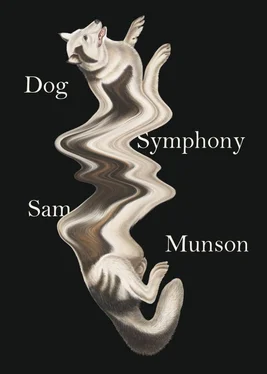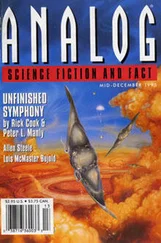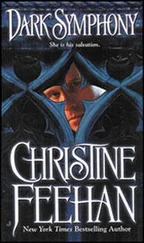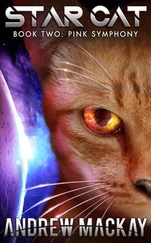I didn’t recognize the swift grayish object that flashed out of the thicket. Neither did Klemperer. Its speed so great, its presence so numinous, that he gave a small, sweaty cry of terror and leaped back. The gray creature scurried between his legs and he tried to dodge again, but this time he missed his footing and fell to the grass. I moved before I knew I was moving. That’s how I overcame the insult. That’s the only way. Pasternak leaped forward and struck Klemperer’s face with the shovel.
The gun fell from his hand. He whistled, he whistled some more, yes. A whistling cry. My first blow opened a deep gash across his cheeks and nose, and I saw within the gash the pearly darkness that had also flowed from the torn lips of the woman Klemperer struck. The second blow destroyed Klemperer’s left eye. His right eye trembled and rolled as he thrashed beneath me. The third blow (and here my transcription becomes more precise) penetrated his skull, and gelatinous gray matter spattered my hands and face. Which is to say Pasternak’s hands and face. Which is to say the face and hands of Boris Leonidovich. Then Klemperer stopped whistling, but I did not stop striking. I raised the shovel and struck again, again, again. With each blow more pearly darkness flowed upward into the light, with each blow this darkness diluted itself, until I could no longer discern the difference between this pearly darkness and the hard sunlight. Klemperer soon stopped moving entirely. The mild, broken hitching of his chest ceased. I kept striking. His skull began to lose its structure. Now bright arterial blood decorated my arms and my face. Droplets flew into my mouth.
The gray creature, the Pampas hare, had observed all this. When I was finished with Klemperer, I raised my eyes to find it crouched, staring, its eyes fiery yellow, its pupils deep, velvety black, its paws and belly cloud-white. I dropped the shovel. The hare stayed there, utterly still, and then darted away. I watched its massive hind legs, its long ears (one notched from a predator’s bite), and its flame-like tail as it vanished. After that, quiet. No more whistling, no more pissing. No sound at all from Pasternak, which is to say me. I picked Klemperer’s gun from where it had fallen. A Browning; as noted, I knew its design. I thumbed the safety off — he had not yet done this, so great was his confidence in the departmental insult and its success — and leaned back against the unbroken stretch of grass thicket. The stiff stems supported me. The problem was clear. Luxemburg. I could not at first decide on the best way to deal with her. If I waited long enough she would arrive but she would arrive suspicious. If I fired a shot, to simulate my own execution, that would provide me with philosophical camouflage, and I could creep back along the path we had broken and attempt to shoot her by the side of the road. That was much riskier, as I could not guarantee my approach would be silent. The method I settled on was simple and stupid. I walked back toward the fence, pushed myself into a deep, dense area of the grass thicket halfway between the gate and the zone where Klemperer lay, and started shouting Luxemburg’s name.
I didn’t have to wait long. The sun above passed from the green tip of one grass stalk to the white panicle of another. Then Luxemburg’s rapid, even footsteps began to rustle, as they had that evening we first met in the history department’s evacuated hallway. She had her gun drawn and raised and she was not running, she cast regular glances to her left and right as she paced forward. In this manner she saw me. I fired as soon as she rotated her numismatic profile. She staggered and fell. The sound of my gunshot almost obscured hers. I had, by sheer chance, struck her squarely in the chest. Her blood, i.e., pearly darkness: well, it appeared. She tried to sit up and failed, proof that my own insult had worked on her. I had so successfully crushed and insulted her that she could not sit up. Because I did not want to walk all the way back to the place I’d left Klemperer, I did not use my shovel this time. I used the butt of her gun. It lay next to another clump of cinquefoil turning its leaves up in a minor breeze.
She shit herself when her forehead caved in. The smell mingled with the smells of the grass, the air, the sunlight, my own sweat, her blood, my blood, Klemperer’s blood, the earth. The crushed and insulted can behave in whatever manner they choose, assuming they have a choice. If they have no choice, this iron and mustache-like law still stands. Therefore the soul exists. No thanks to the great defecator, God. Amen.
AHEAD OF ME, FLOATING in the dimness, a stripe of raw-looking flesh. It belonged to no one, no one at all.
Instead, I decided to observe the meat truck that had been driving next to me almost since I left the field near Cañuelas. The driver smiled through his window. I returned the smile through mine. He mistook me, I think, for a Departmental officer. I was wearing Klemperer’s uniform and over it the sky-blue windbreaker I found folded into a dense, loud oblong beneath the passenger seat. The windbreaker hid the blood speckling its collar and epaulettes and concealed, as well, the widening, continental stain my own blood was leaving on the cloth. I’d shoved Luxemburg’s undershirt against the wound. I didn’t know if Ojea’s drivers had to obey a protocol regarding Departmental officers. This driver, my driver, seemed intent on screening me from traffic, and thus from threats. Possibly he was obeying; possibly he was concerned about my fate. The huge blue words on the side panel vibrated along with the nonexistent carbuncles. I was concerned at first that these visual phenomena would interfere with my ability to drive, but they did not.
Violeta’s admonition about the airport closure concerned me. Or rather it concerned Pasternak. I myself felt only a mild eddy, a mild disturbance. Besides, it was almost sunset now, almost dusk. Had I slept, after dragging myself into the driver’s seat? In any case, time was lost, no matter how or how much. Other people seemed to be heading for the airport, taxis streamed toward the same off-ramp I took. When we pulled into the complex of overpasses and access roads around Pistarini, it was clear the airport was fully operational. Indeed, there was not even any residual traffic or congestion. I reached the long-term lot without difficulty (except for a few more sprays of pink foam from my mouth, because I’d started to cough). There was a line, but a normal one, and it made no difference because the parking attendants waved me ahead of the cars waiting. No one objected, I watched in the rearview mirror for rebellion among the drivers and passengers I was defrauding, but their faces remained set, still, uniform. The roofed lot smelled like gasoline. Lackeys in sky-blue coveralls, like the one I had seen effacing Ana’s name from her office door, carried red cans into a dark doorway near where I parked. I stepped down from the van. They averted their eyes from my passage. Luxemburg’s undershirt was warm and tacky against my skin, dense now with my own blood. The parking lot elevator stank of gasoline more strongly than the lot itself. A lackey had spilled fuel here and said nothing. Silence being the number one weapon of lackeys.
On a high walkway inside the main terminal, I watched through a window a detachment of my fellow officers (so to speak) marching out past the runways to the fen-like waste fields that surrounded Pistarini. The air I inhaled still cold and still sweet. I counted four officers, three women and one man, all carrying shovels. They reached a far point out in the field and set to work, their shovels glinting in the sunlight. They dug and they dug. Gray earth flew in spurts. The hole, rectilinear, deepened, grew darker, a void in the bright day. They stopped work. Their mouths moved in laughter. One, a woman, planted her shovel blade in the ground. From this ground, it seemed, some tender, some human curl was arising, black and dense. Above the digging officers, planes angled earthward. On the north terminal wall, a sky-blue banner hung. From ceiling to floor. It too trembled in the ceaseless, invisible breeze. Sketched on it in outline the features of Sanchis Mira. Mustache, necktie. His large hands at rest on a closed book. All the porteños in the airport ignored the banner; all the tourists pointed at it and murmured, assuring each other that it was a statesman, an Argentine statesman long dead. One even guessed it was Pistarini himself. It must be, he muttered, or why would they hang it so prominently? The tourists did not avert their eyes from mine as I passed among them, but the porteños did.
Читать дальше












